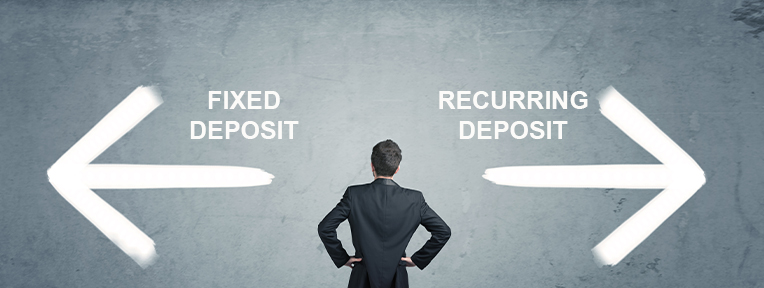
Fixed Deposit vs Recurring Deposit: Key Differences Explained
Posted on Thursday, November 28th, 2024 | By IndusInd Bank
Have you ever given a thought to which savings option matches your needs the best – a Fixed Deposit (FD) or a Recurring Deposit (RD)? Both are enticing investment options, but they cater to distinct financial requirements and needs.
Before we dive into the differences, let’s first understand what Fixed Deposits (FDs) and Recurring Deposits (RDs) are.
What is a Fixed Deposit?
A Fixed Deposit (FD) is one of those classic savings tools that never goes out of style. It involves placing a lump sum with a bank for a fixed period at a pre-agreed interest rate. Being simple, secure, and predictable, fixed deposits are a favourite among those who prefer steady returns without the market drama.
Once you lock in the rate, it stays the same for the entire tenure, no matter how the markets move. At the end of the term, you get back your principal along with the interest earned, making it a stress-free way to grow your money.
Features of a Fixed Deposit
Here’s why many savers still swear by fixed deposits:
- One-Time Investment: Just a single deposit when you open the FD. No monthly commitments.
- Fixed Tenure: Choose a period that suits you, anywhere from 7 days to 10 years.
- Assured Returns: The rate is fixed upfront, so you know exactly what you’ll earn.
- Premature Withdrawal: Need the funds early? You can withdraw before maturity (though a small penalty may apply).
- Loan Facility: Many banks let you borrow against your FD if you’re in a cash crunch.
What is a Recurring Deposit?
A Recurring Deposit (RD) is like the disciplined cousin of an FD. Instead of investing a large amount at once, you set aside a fixed sum every month. Over time, this habit builds into a tidy corpus. This is ideal for those looking to save gradually and consistently.
Each deposit earns interest, and by the time the term ends, you get your total contributions plus the interest. It’s perfect for those who want to cultivate a savings habit without feeling the pinch.
Features of a Recurring Deposit
Let’s break down what makes recurring deposits a smart choice for regular savers:
- Monthly Contributions: Deposit a fixed amount every month. It makes budgeting easy.
- Fixed Tenure: Terms typically range from 6 months up to 10 years.
- Stable Returns: Earn interest that’s usually compounded quarterly or monthly, depending on the bank.
- No Lump Sum Needed: Ideal for anyone who prefers spreading out their investment.
- Penalty for Missed Payments: If you skip a payment, a small penalty might apply. So, staying regular pays off.
FD vs. RD: A Quick Comparison
Whether you are looking to lock away a lump sum or establish a habit of regular savings, understanding the differences between these two can help you make a well-informed decision. Here’s a breakdown of the differences between FDs and RDs.
1. Investment Pattern
A fixed deposit account allows you to invest a lump sum amount in a single go. It is best for those who have a sizable amount of money and want to earn a steady interest over a fixed investment tenure. This is especially advantageous if you have a windfall or surplus funds that you do not need to utilise instantly.
RDs allow you to deposit a fixed amount every month. This is prudent for those who wish to save regularly over a period and gradually build a considerable amount. RDs are best for salaried individuals who can set aside a small portion of their income every month. It inculcates a disciplined savings habit, ensuring that even small savings grow into a considerable sum over time.
2. Interest Rates
When it comes to choosing based on FD vs recurring deposit, an important aspect that must be considered is the interest rate. Both RDs and FDs offer enticing and similar interest rates.
Since the interest rates are similar, you need to consider your investment goal and strategy to assess which one is more appealing to you. You can also utilise an online FD calculator to estimate your earnings from your FD investments and weigh your options.
3. Tenure Flexibility
In the case of a fixed deposit account, you can choose the investment tenure, ranging between seven days and 10 years. Once locked in, it stays fixed unless you consider premature withdrawal. This fixed tenure offers predictability in returns, helping you plan out your finances with certainty. The wide range of tenure options also allows you to match your investment with specific financial goals, whether long-term or short-term.
The tenure in RD is fixed at the start, generally ranging from nine months to five years and above, and you commit to monthly deposits for the whole period. This commitment to regular deposits assists in accumulating a considerable amount over time, particularly for those who prefer systematic savings. The fixed tenure of RDs can also be aligned with your goals, such as planning for a major purchase or your child’s higher education.
Opt for IndusInd Bank FDs
If you are leaning towards FDs over RDs for investing, then selecting a financial institution that offers enticing interest rates along with financial security and stability is crucial. For this purpose, you can consider IndusInd Bank FDs.
Why may you wonder? To understand, read on the benefits:
| Benefit | Overview |
| Instant booking | Book your FD online in three simple steps with just your Aadhaar and PAN details. This seamless and quick process ensures your investment begins earning interest without any delay |
| High interest rate | Earn best-in-class interest rates of up to 7.75% p.a. (subject to change; for the latest fixed deposit interest rates). These rates help enhance the returns on your investment, making it a prudent choice for long-term wealth building |
| Interest payout options | Choose from distinct interest payment options – monthly, quarterly, half-yearly, yearly, or at maturity. This flexibility allows you to manage your cash flow and reinvestment plans efficiently |
| Video KYC facility | Complete your KYC instantly through video KYC and book an FD of any amount. This feature also allows your large investments to be processed securely and smoothly from the comfort of your home or office |
Also Read: Top 5 reasons to open a bank fixed deposit
Ending Note
Selecting between an FD and an RD depends on your financial goals. FDs are prudent for those with a lump sum to invest and who prefer higher returns with flexible investment tenure. In contrast, RDs suit individuals aiming for disciplined savings over time.
If you are considering an FD, IndusInd Bank Fixed Deposits stand out owing to the attractive rates, hassle-free booking process, and convenient options for interest payment and KYC completion. Whether you are investing a huge amount or building your savings step by step, IndusInd Bank has a customised solution for you.
So, do not wait any longer. Start securing your financial future and book an FD online today!
Disclaimer: The information provided in this article is generic in nature and for informational purposes only. It is not a substitute for specific advice in your own circumstances. Hence, you are advised to consult your financial advisor before making any financial decision. IndusInd Bank Limited (IBL) does not influence the views of the author in any way. IBL and the author shall not be responsible for any direct/indirect loss or liability incurred by the reader for taking any financial decisions based on the contents and information.



 Offers
Offers Rates
Rates Debit Card Related
Debit Card Related Credit Card Related
Credit Card Related Manage Mandate(s)
Manage Mandate(s) Get Mini Statement
Get Mini Statement
 categories
categories Bloggers
Bloggers Blog collection
Blog collection Press Release
Press Release


